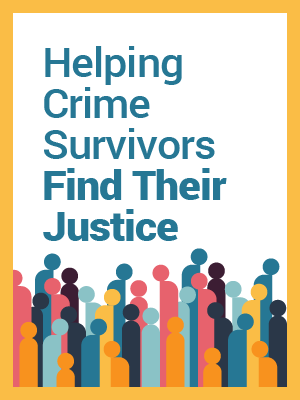Archival Notice
This is an archive page that is no longer being updated. It may contain outdated information and links may no longer function as originally intended.
Tribal Communities
American Indians and Alaska Natives (AI/AN) suffer from one of the highest rates of victimization in the country. Cultural differences, remote locations, and challenging jurisdictional issues make providing victim services in Tribal communities complex. In its work with Tribes, OVC pays particular attention to honoring our government-to-government relationship with our Tribal government grantees and to supporting Tribes in providing culturally appropriate services for victims.
Tribal Services Set-Aside From the Crime Victims Fund
The FY 2018 Commerce, Justice, Science, and Related Agencies Appropriations Act provided for $133 million—3 percent of the Crime Victims Fund (the Fund) allocation—to be used to support a broadly applicable Tribal set-aside program for Tribes to provide services for crime victims. Congress authorized subsequent Tribal set-asides of—
- $167.65 million in 2019.
- $132.50 million in 2020.
- $100.75 million for 2021.
- $130 million in 2022.
Tribal set-aside funding is used to support grants and training and technical assistance (TTA) designed to improve and expand victim services in American Indian and Alaska Native communities and to build the capacity of Tribes to respond to crime victims’ needs.
In FY 2021, OVC made 142 Tribal Victim Services Set-Aside (TVSSA) formula awards totaling $90,321,186. Remaining funds supported TTA projects to help Tribes implement their victim services projects, creation of a map of all available victim service projects, support for victim service specialists to assist victims with federal cases, planning for the December 2022 Indian Nations Conference, and support for the Tribal Assistance Program to connect Tribes to federal criminal justice databases.
In accordance with testimony received during OVC's January 2022 Tribal consultation, OVC again used an administrative formula to determine FY 2022 allocations for each eligible applicant based on the submitted Tribal Population Certifications. OVC made 169 TVSSA awards in FY 2022, totaling $116,260,509. The remaining set-aside funds supported—
- training and technical assistance projects to support Tribes in implementing their victim services projects.
- delivering the 17th National Indian Nations Conference in December 2022.
- hiring victim service specialists to assist victims with federal cases.
- providing funding to Tribes participating in Project Beacon: Increasing Access to Services for Urban American Indian and Alaska Native Victims of Human Trafficking and in the Coordinated Tribal Assistance Solicitation program.
OVC received 194 population certifications in FY 2022—the highest number submitted since Congress authorized the set-aside—but by July 2022, 21 Tribes had either withdrawn or did not complete an application. OVC learned that staff or leadership turnover, lack of time to develop an application, not enough communication from OVC, and confusion about the application process contributed to the withdrawals. Enhancing the application process to address these comments, supporting renovation and construction projects, and strengthening services related to missing or murdered Indigenous persons (MMIP) became priorities for the FY 2023 OVC TVSSA Formula Program period.
In 2022, in response to requests from Tribes and in coordination with OJP Counsel, OVC determined that TVSSA funding can be used to help in cases of missing and murdered Indigenous persons (MMIP) by—
- providing services to the family members of MMIP victims.
- generating awareness of MMIP in general among community members as well as individual MMIP cases.
- collaborating with Tribal, federal, and state and local officials to respond to MMIP cases.
More information is available in the MMIP fact sheet.
Coordinated Tribal Assistance Solicitation Program
DOJ’s Coordinated Tribal Assistance Solicitation (CTAS) funds federally recognized Tribes, Tribal consortia, and tribally designated organizations. Through CTAS, federally recognized Tribes and Tribal consortia submit a single application for most of DOJ’s Tribal grant programs. DOJ designed this comprehensive approach to save time and resources, and to allow Tribal organizations and the Department to gain a better understanding of the Tribes’ overall public safety needs.
CTAS Purpose Area 6, managed by OVC, is funded under the Children’s Justice Act Partnerships for Indian Communities (CJA) to support communities in developing, establishing, and operating programs that improve the investigation, prosecution, and handling of child abuse—especially child sexual abuse—in a culturally appropriate and trauma-informed manner to lessen trauma for child victims. In FY 2021, OVC funded seven Tribes under CJA, awarding a total of nearly $3 million. In FY 2022, OVC funded 10 Tribes under CJA and the Tribal Set-Aside, awarding a total of more than $4 million.
TVSSA and CTAS Grantee Organizations Serving Tribal Victims
In FY 2021 and 2022, there were 473 active Tribal awards (from CTAS and TVSSA grant programs) that accounted for approximately $347 million in grant funds awarded between 2018 and 2021 from OVC. These organizations included Tribal justice centers, health councils, cooperative associations, foundations, commissions, and community action programs. Between these two grant programs, 58,846 victims were served including new and returning individuals in FY 2021. Of that total, there were 27,427 unique victims of crime served for the first time. Domestic or family violence; adult physical assault; child physical abuse or neglect; and stalking or harassment were the most common victimizations reported. The most common services provided were individual advocacy (59,125 occurrences); referral to other services, supports, and resources (25,545 occurrences); transitional housing (19,271 occurrences); and emergency shelter and safe housing (9,221 occurrences).
Developing Future Victim Specialists
It can be difficult to hire and retain qualified victim specialists and advocates who serve victims in remote Indian Country and Alaska Native villages. Through the Developing Future Victim Specialists to Serve American Indian/Alaska Native Victims of Crime program, OVC sought to cultivate a workforce focused on providing services to AI/AN victims in hard-to-staff positions and locations. By identifying and training prospective victim service professionals in the early stages of their post-secondary education and career, Tribal and Bureau of Indian Affairs’ (BIA) victim services programs will hopefully have an easier time filling victim service positions in remote Tribal locations. OVC made five awards totaling $2.243 million to Tribes and Tribal-serving entities under this program in FY 2020.
In FY 2021 and 2022, 5 grantee organizations conducted 185 trainings for 94 participants. Additionally, 69 interns attended 310 external trainings. An average of 27 partners per 6-month reporting period was reported, with an average of 11 partners that received grant funds. Grantees received 92 applications to the internship programs and hired 65 interns. During these 2 years, there were 33 interns who completed the program.
Tribal Access Program
DOJ launched the Tribal Access Program (TAP) for National Crime Information in August 2015 and has expanded the program yearly so Tribes can access national crime information systems for both civil and criminal purposes. TAP allows Tribes to more effectively serve and protect their communities by ensuring the exchange of critical data across the Criminal Justice Information Services system and other national crime information systems.
In FY 2021, OVC administered $420,000 in TAP funding. Using TAP, Tribes have shared information about missing persons and registered convicted sex offenders; entered domestic violence orders of protection for nationwide enforcement; run criminal histories; identified and arrested fugitives; entered bookings and convictions; and completed fingerprint-based record checks for non-criminal justice purposes such as screening employees or volunteers who work with children. For more information, visit the TAP website.
OVC Support for Bureau of Indian Affairs Programs
OVC funds several victim-centered Bureau of Indian Affairs (BIA) programs to assist in BIA’s mission to enhance quality of life, promote economic opportunity, and fulfill the responsibility of protecting and improving the lives of those in AI/AN communities. In FY 2021 and 2022, OVC administered a total of $3.4 million (for a period of 4 years) to support victim specialists (and related costs) at various Tribal locations under BIA jurisdiction to provide direct victim assistance and help ensure that all crime victims receive the services and referrals they need and are entitled to under U.S. Department of the Interior/BIA policy, the Victims’ Rights and Restitution Act, and the Attorney General Guidelines for Victim and Witness Assistance.
In FY 2021, OVC transferred $30,000 to BIA for the Federal Crime Victim Assistance Fund, which was first created in FY 2017 and supports short-term emergency services for victims of federal crimes when no other resources are available. Through these funds, BIA will make goods and services available to victims of federal crime.
Technical Assistance and Capacity Building Delivered to Tribal Communities
Programmatic TTA
OVC funds the Tribal Victim Services Training and Technical Assistance (T-VSTTA) program to deliver culturally relevant programmatic TTA to its Tribal grantees nationwide. Services include communicating with grantees about important notices, available resources, and upcoming TTA opportunities. They also provide assistance with capacity building, grant compliance, sustainability, strategic planning, delivering specialized training opportunities via eLearning and in-person methods, and facilitating opportunities for grantees to engage in peer-to-peer mentoring.
In partnership with Tribes within the Anchorage Service Unit and nonprofit partners, the Alaska Native Justice Center offers victim-centered TTA services free of charge to existing and emergent Alaska Tribal justice systems. TTA offerings reflect the particular needs of Anchorage Service Unit Tribal communities.
The Alaska Native Women’s Resource Center is dedicated to strengthening Tribal governments’ responses to domestic and sexual abuse and violence. It provides targeted technical assistance to develop and implement culturally tailored training for remote Alaska Native villages on responding to domestic and sexual abuse and violence.
In FY 2022, the Minnesota Indian Women’s Sexual Assault Coalition was awarded $575,000 to provide training and technical assistance to five project sites, all funded through the Project Beacon: Increasing Access to Services for Urban American Indian and Alaska Native Victims of Human Trafficking Program. The goal of this program is to increase the quantity and quality of victim-centered services available to assist AI/AN victims of human trafficking in urban areas.
In FY 2019, OVC committed $21 million in TVSSA funding to the Denali Commission and National Congress of American Indians (NCAI) to make microgrant awards to Tribes that had not received TVSSA funding in FY 2018 or 2019 in Alaska and the Lower 48. In addition to expanding the reach of the TVSSA funding, the goal is to support these Tribes in developing their capacity to manage a grant award and serve crime victims. Under the terms of the initiative, the Denali Commission and NCAI were authorized to solicit a second round of applicants if they were unable to exhaust the funds in the first round. Allowable activities for this funding mirrors TVSSA program activities. Currently, both the Denali Commission and NCAI have completed both rounds of funding and are working with the recipients on project development and implementation.
Financial Management Capacity for Tribes
Since 2018, the Tribal Financial Management Center (TFMC) has provided data-informed, culturally humble, victim-centered training and technical assistance (TTA) and resources to support AI/AN communities as they successfully manage the financial aspects of their federal awards. TFMC offers customized virtual and onsite TTA, a Virtual Support Center, financial management needs assessments, dynamic programming (webinars, regional trainings, open office hours, and Learning Circles), and robust curriculums, including tiered, interactive micro-learnings and more than 50 Financial Policies and Procedures Guide Sheets and job aids to enhance existing financial management capacity and support grantee award implementation.
TFMC serves 310 distinct Tribal entities with more than 800 victim service awards, conducting more than 470 intensive TA engagements since project inception. Almost a third of the grantees are from Alaska, and those located in the Lower 48 span the continental United States, including four time zones from the Makah Tribal Council in western Washington to the Aroostook Band of Micmacs in northeastern Maine. There are unique delivery challenges because of remote and rural locations, including access to broadband, regional differences, grantee staff turnover, availability of financial management resources, variability in preferences for receiving content, and diversity of spoken languages. TFMC is mindful of the diversity of its audience and deliberate about providing responsive TA and accessible options for grantee engagement and material delivery.
The assistance available spans the life cycle of an OJP award—from application preparation to award acceptance, and ultimately, the effective financial implementation, management, and reporting. Financial specialists are uniquely trained and qualified to meet the diverse and varied needs of grantees.
TFMC is intentional about meeting grantees where they are and providing meaningful financial management support as they implement programs to enhance service to crime victims and address public safety in their communities.
Human Trafficking Capacity Building for Tribes
The Human Trafficking Capacity Building Center is a partner in human trafficking education, healing support services, and resource identification to Tribes and organizations that work with American Indians and Alaska Natives. The center partnered with Tribes and organizations building their capacity to assist all victims of human trafficking with minimal demands on their time.
From January 2021 to December 2022, the center connected with more than a third of all federally recognized Tribes through its Talking Circle series, reaching 9,243 registrants. A Talking Circle participant said, “sometimes we wonder if we are doing a good job as advocates, then you come to a platform like here today and know every effort you make is a step in the right direction.” During these Talking Circles, American Indian and Alaska Native practitioners answered participant questions about human trafficking and Native youth; supporting survivors; funding healing; and Native men and boys and sexual violence.
The center partnered with 11 Tribes and Native-serving organizations and presented at regional events to share human trafficking educational information as a result of the Talking Circle series. In addition—to build awareness of missing or murdered Indigenous people (MMIP) and the potential intersections with human trafficking—the center hosted two Talking Circles on MMIP, produced a 5-minute MMIP educational video, supported the creation of When a Loved One Goes Missing: Resources for Missing American Indian and Alaska Native Adults, and launched an MMIP topic page.
Tribal Convenings
OVC takes seriously its responsibility to hold formal consultations with Tribal leaders and held several consultations in FYs 2021 and 2022:
- Office on Violence Against Women’s 17th Annual Government-to-Government Violence Against Women Tribal Consultation in Anchorage, Alaska, September 20-23, 2022.
- Tribal Set-Aside Consultation, held virtually on January 13 and January 14, 2022.
- Tribal Set-Aside Consultation, held virtually on July 29, 2021.
- Tribal Set-Aside Consultation, held virtually on November 17 and November 18, 2020.
For additional information, visit OVC’s website.




